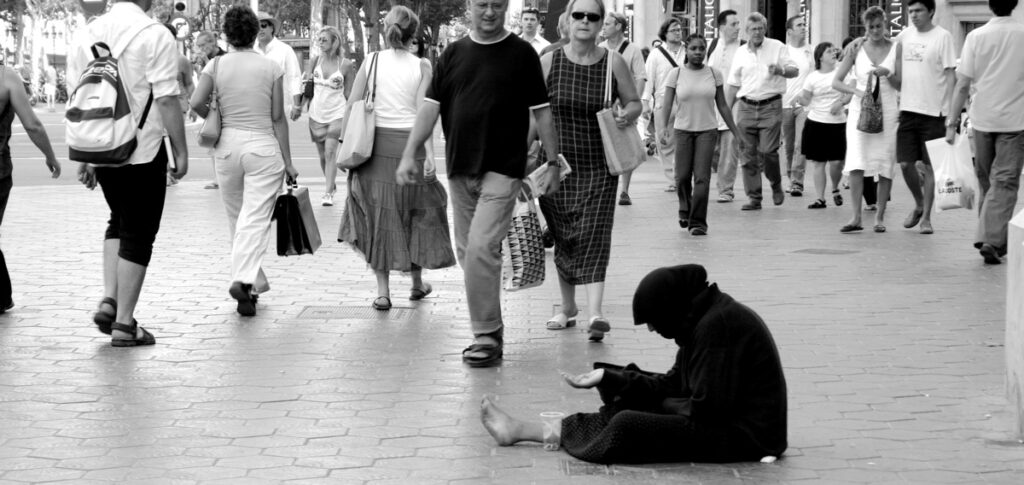A dusty track outside Jericho. A blind man begging at the roadside. A moment of healing.
It’s perhaps the least well-known healing story from the Gospels (Mark 10:46–52). Not the healing of Bartimaeus, a poor, blind, marginalised man. That healing is fairly well known. Rather, the healing Jesus performs before he even turns to Bartimaeus. The healing of the crowd.
The scene is sharply and swiftly drawn. As Jesus leaves Jericho, followed by a crowd, a blind beggar, Bartimaeus, shouts out from the side of the road, “Jesus, Son of David, have mercy on me!” It could simply be the cry of a beggar, hoping for some coin from someone reputed to be in the lineage of King David. It could be a call to one with a powerful reputation as a healer.
Whatever Bartimaeus means, the crowd will not have it. “They sternly ordered him to be silent…” To shut up. To stay in his place. (The Greek connotes a forceful, almost threatening, rebuke.)
So often in our world those with power react the same way when those without power speak up or step out of their place to claim their dignity and their rights. Any movement from those on the bottom of the heap can be seen as a threat to the social order that enriches and privileges some at the expense of others.
Threats themselves are often not even needed. The rules of the game have been set and internalised by all the players. We all know that those without money, without work, with a disability, from the “wrong” social group, are worth less. Tragically, they themselves often know this too.
Yet, Bartimaeus will not be silenced and cries out even more loudly.

There are many moments when Jesus goes out to those who have been pushed to the margins, but here he brings the marginalised one into the centre of his, and the crowd’s, concerns. In one deft move, Jesus invites the crowd to turn their treatment of Bartimaeus from threats, exclusion and silencing to welcome, inclusion and respect.
His first act of healing is not for Bartimaeus. It is for the crowd.
Jesus stood still and said, “Call him here.” And they called the blind man, saying to him, “Take heart; get up, he is calling you.”
And when, in response, Bartimaeus springs to his feet and approaches him, Jesus does not assume that he knows what is best for him, or what he really needs. He does not rush to provide coin or healing, but pays Bartimaeus the respect of asking what it is that he wants. He gives Bartimaeus the opportunity to speak with dignity from his place of faith and hope.
“My teacher, let me see again.”
And as Jesus commends his faith, Bartimaeus follows Jesus “on the way” – a disciple.
So at the same time as we take heart from Bartimaeus’ courageous faith, we also need to be challenged by Jesus’ healing of the crowd. Jesus confronts us in the same way about how we exclude or silence people in poverty, or dismiss their claims and their cries. He invites us to examine the ways that we, our tribes, and our nation, act as a “crowd” to threaten violence, to silence the marginalised, to protect our own privilege.
He asks us to confront the ways we might slash life-saving aid, while at the same time increasing death-dealing military spending. The ways we might rest content with a global financial system that enriches the already wealthy and robs the poorest. The ways we might store up trouble in our shared sky and continue to build our national wealth on the fossil fuels whose emissions are sinking our Pacific neighbours.
Jesus asks us to join Him and place the vulnerable, poor, marginalised person, at the centre of our concern. To take the moment and pay the respect of asking, “What is it that you want?” To hear God’s call on us in the answer.
Jesus knows that we need His healing as much as anyone.
———————-
Ben Thurley is the National Coordinator of Micah Australia.